法律英语__第九课_合同法
- 格式:ppt
- 大小:967.50 KB
- 文档页数:13
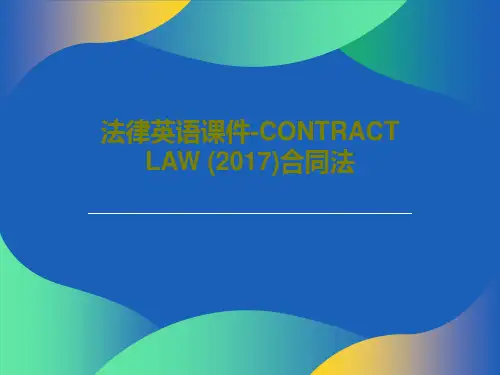
![法律英语第九课 Contract Law[精]](https://uimg.taocdn.com/7279efcd04a1b0717fd5ddcc.webp)
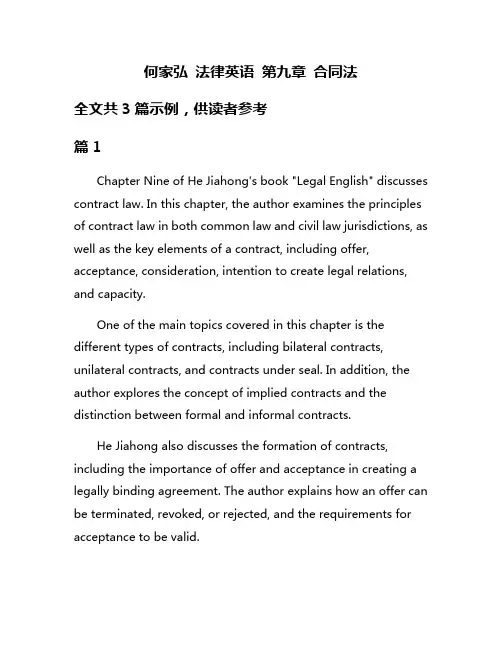
何家弘法律英语第九章合同法全文共3篇示例,供读者参考篇1Chapter Nine of He Jiahong's book "Legal English" discusses contract law. In this chapter, the author examines the principles of contract law in both common law and civil law jurisdictions, as well as the key elements of a contract, including offer, acceptance, consideration, intention to create legal relations, and capacity.One of the main topics covered in this chapter is the different types of contracts, including bilateral contracts, unilateral contracts, and contracts under seal. In addition, the author explores the concept of implied contracts and the distinction between formal and informal contracts.He Jiahong also discusses the formation of contracts, including the importance of offer and acceptance in creating a legally binding agreement. The author explains how an offer can be terminated, revoked, or rejected, and the requirements for acceptance to be valid.Another important aspect of contract law that is examined in this chapter is the doctrine of consideration. He Jiahong explains the significance of consideration in contract formation and the rules regarding adequacy of consideration and past consideration.Furthermore, the author delves into the principles of intention to create legal relations and capacity in contract law. He explains how parties must have the intention to be legally bound by the terms of a contract for it to be enforceable, and the rules regarding minors, intoxicated persons, and mentally incapacitated individuals entering into contracts.Overall, Chapter Nine of "Legal English" by He Jiahong provides a comprehensive overview of contract law principles and key concepts. By examining the various aspects of contract formation, the author offers a thorough understanding of the legal framework that governs contractual relationships in both common law and civil law systems.篇2Title: Chapter Nine of He Jiahong's "Legal English: Contract Law"Chapter Nine of He Jiahong's "Legal English: Contract Law" delves into the intricate details of contract law and provides a comprehensive overview of the key concepts and principles governing contractual relationships. This chapter examines the formation, interpretation, and enforcement of contracts, as well as the rights and obligations of the parties involved.One of the central themes of this chapter is the concept of offer and acceptance, which is essential for the formation of a valid contract. According to He Jiahong, an offer is a proposal by one party to enter into a contract on certain terms, while acceptance is the unconditional agreement to the terms of the offer. The chapter outlines the requirements for a valid offer and acceptance, including communication of the offer and acceptance, intention to create legal relations, and certainty of terms.Moreover, He Jiahong discusses the importance of consideration in contract law, which refers to the exchange of something of value between the parties. He explains that consideration is necessary to make a contract legally binding and distinguishes it from a mere promise or gift. The chapter explores different types of consideration, such as goods, services,or money, and highlights the role of consideration in preventing gratuitous promises.Furthermore, this chapter addresses the issue of contractual interpretation, emphasizing the importance of interpreting contracts objectively and in accordance with the parties' intentions. He Jiahong explains that the courts will consider the language of the contract, the surrounding circumstances, and the parties' conduct to determine the meaning of the agreement. He also discusses the various rules of contractual interpretation, such as the contra proferentem rule and the parole evidence rule.In addition, He Jiahong examines the remedies available for breach of contract, including damages, specific performance, and injunctions. He explains that damages are the most common remedy for breach of contract and can be awarded to compensate the non-breaching party for any losses suffered as a result of the breach. The chapter also explores the principles governing the assessment of damages, such as remoteness, mitigation, and causation.Overall, Chapter Nine of He Jiahong's "Legal English: Contract Law" provides a comprehensive overview of the key principles and concepts of contract law. It offers valuable insightsinto the formation, interpretation, and enforcement of contracts, as well as the rights and obligations of the parties involved. This chapter serves as an essential resource for students, practitioners, and scholars seeking to deepen their understanding of contract law in a legal English context.篇3Chapter 9 Contract LawContract law is a fundamental part of the legal system in most countries around the world. The principles of contract law govern the relationships between parties entering into agreements, and are essential for regulating commerce and promoting fairness in business dealings. In this chapter, we will examine the key concepts and principles of contract law as outlined by legal scholar He Jiahong in his book on legal English.One of the fundamental principles of contract law is the concept of offer and acceptance. An offer is a promise by one party to do something in exchange for something from the other party, and acceptance is the agreement to the terms of the offer. For a contract to be legally binding, there must be a valid offer and acceptance between the parties involved. This principle iscrucial in determining whether a contract exists and what the terms of the contract are.Another important concept in contract law is consideration. Consideration is the exchange of something of value between the parties, such as money, goods, or services. In order for a contract to be enforceable, there must be consideration from both parties. This principle ensures that both parties are giving something of value in exchange for the promises made in the contract.The principle of intention to create legal relations is also essential in contract law. This principle states that the parties must have intended for their agreement to be legally binding. In commercial agreements, this intention is usually assumed. However, in other types of agreements, such as family agreements, the intention to create legal relations may not be present, and therefore the agreement may not be legally binding.One of the key components of contract law is the concept of capacity. Capacity refers to the legal ability of a party to enter into a contract. Minors, people of unsound mind, and those under the influence of drugs or alcohol may lack capacity toenter into a contract. In these cases, the contract may be voidable by the party lacking capacity.Contracts can also be classified into different types, such as bilateral and unilateral contracts. Bilateral contracts involve a promise from each party to the other, while unilateral contracts involve a promise from one party in exchange for an act from the other party. Understanding the different types of contracts is essential for interpreting and enforcing contract law.In conclusion, contract law is a complex and important area of legal study. Understanding the key concepts and principles of contract law is essential for anyone entering into business agreements or other contractual relationships. By following the guidelines outlined in this chapter, parties can ensure that their agreements are legally binding and enforceable.。
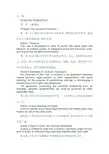
总则GENERAL PRINCIPLES第一章一般规定Chapter One: General Provisions第一条为了保护合同当事人的合法权益,维护社会经济秩序,促进社会主义现代化建设,制定本法。
Article 1 PurposeThis Law is formulated in order to protect the lawful rights and interests of contract parties, to safeguard social and economic order, and to promote socialist modernization.第二条本法所称合同是平等主体的自然人、法人、其他组织之间设立、变更、终止民事权利义务关系的协议。
婚姻、收养、监护等有关身份关系的协议,适用其他法律的规定。
Article 2 Definition of Contract; ExclusionsFor purposes of this Law, a contract is an agreement between natural persons, legal persons or other organizations with equal standing, for the purpose of establishing, altering, or discharging a relationship of civil rights and obligations.An agreement concerning any personal relationship such as marriage, adoption, guardianship, etc. shall be governed by other applicable laws.第三条合同当事人的法律地位平等,一方不得将自己的意志强加给另一方。
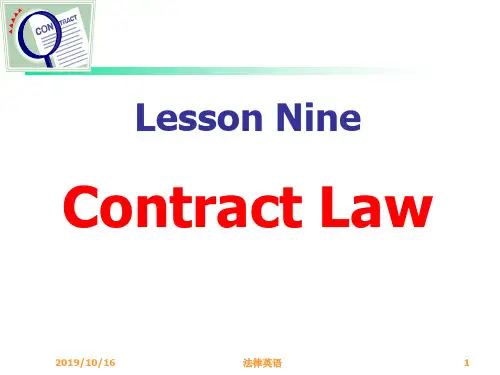
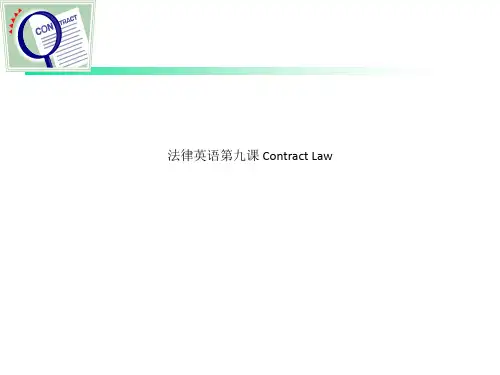
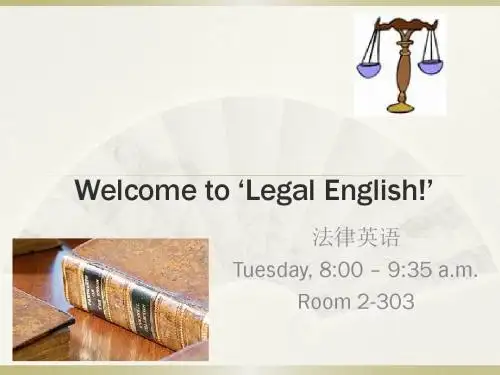

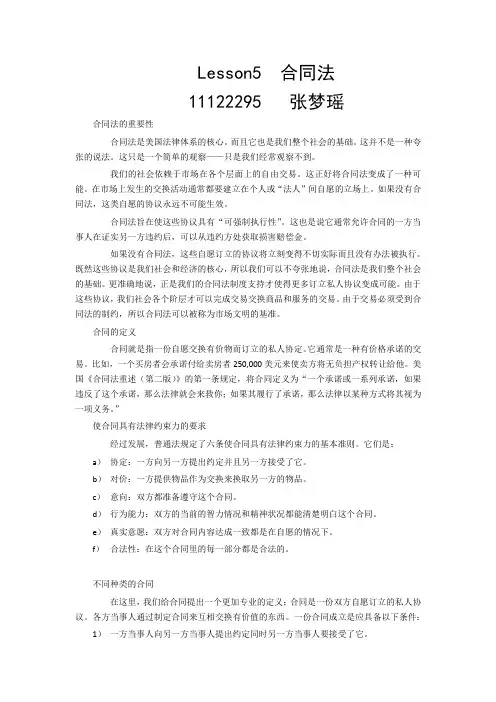
Lesson5 合同法11122295 张梦瑶合同法的重要性合同法是美国法律体系的核心。
而且它也是我们整个社会的基础。
这并不是一种夸张的说法。
这只是一个简单的观察——只是我们经常观察不到。
我们的社会依赖于市场在各个层面上的自由交易。
这正好将合同法变成了一种可能。
在市场上发生的交换活动通常都要建立在个人或“法人”间自愿的立场上。
如果没有合同法,这类自愿的协议永远不可能生效。
合同法旨在使这些协议具有“可强制执行性”。
这也是说它通常允许合同的一方当事人在证实另一方违约后,可以从违约方处获取损害赔偿金。
如果没有合同法,这些自愿订立的协议将立刻变得不切实际而且没有办法被执行。
既然这些协议是我们社会和经济的核心,所以我们可以不夸张地说,合同法是我们整个社会的基础。
更准确地说,正是我们的合同法制度支持才使得更多订立私人协议变成可能。
由于这些协议,我们社会各个阶层才可以完成交易交换商品和服务的交易。
由于交易必须受到合同法的制约,所以合同法可以被称为市场文明的基准。
合同的定义合同就是指一份自愿交换有价物而订立的私人协定。
它通常是一种有价格承诺的交易。
比如,一个买房者会承诺付给卖房者250,000美元来使卖方将无负担产权转让给他。
美国《合同法重述(第二版)》的第一条规定,将合同定义为“一个承诺或一系列承诺,如果违反了这个承诺,那么法律就会来救你;如果其履行了承诺,那么法律以某种方式将其视为一项义务。
”使合同具有法律约束力的要求经过发展,普通法规定了六条使合同具有法律约束力的基本准则。
它们是:a)协定:一方向另一方提出约定并且另一方接受了它。
b)对价:一方提供物品作为交换来换取另一方的物品。
c)意向:双方都准备遵守这个合同。
d)行为能力:双方的当前的智力情况和精神状况都能清楚明白这个合同。
e)真实意愿:双方对合同内容达成一致都是在自愿的情况下。
f)合法性:在这个合同里的每一部分都是合法的。
不同种类的合同在这里,我们给合同提出一个更加专业的定义:合同是一份双方自愿订立的私人协议。
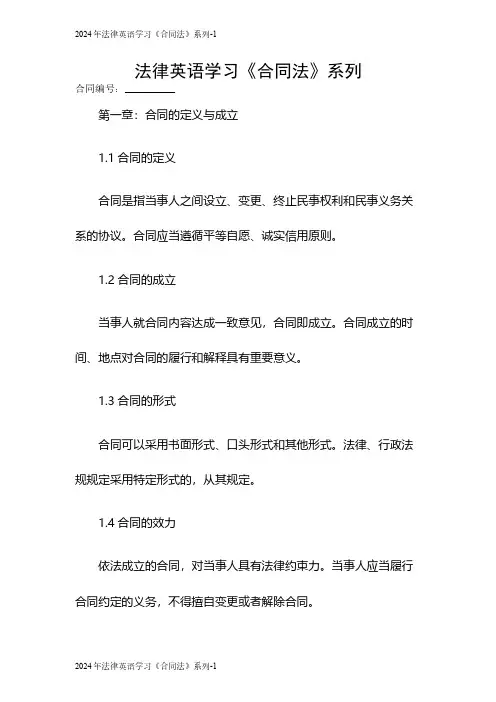
法律英语学习《合同法》系列合同编号:__________第一章:合同的定义与成立1.1合同的定义合同是指当事人之间设立、变更、终止民事权利和民事义务关系的协议。
合同应当遵循平等自愿、诚实信用原则。
1.2合同的成立当事人就合同内容达成一致意见,合同即成立。
合同成立的时间、地点对合同的履行和解释具有重要意义。
1.3合同的形式合同可以采用书面形式、口头形式和其他形式。
法律、行政法规规定采用特定形式的,从其规定。
1.4合同的效力依法成立的合同,对当事人具有法律约束力。
当事人应当履行合同约定的义务,不得擅自变更或者解除合同。
2.1合同的履行当事人应当按照约定履行合同义务。
履行合同义务应当符合约定的质量、数量、期限、地点和方式。
2.2合同的担保当事人可以约定担保。
担保包括保证、抵押、质押、留置和定金等形式。
担保的具体内容由当事人约定。
2.3合同的变更和转让当事人协商一致,可以变更合同。
法律、行政法规规定变更合同应当办理批准、登记等手续的,从其规定。
当事人可以转让合同权利和义务,但应当通知对方,并经受让人同意。
2.4合同的终止合同履行;抵消;提存;免除;混同。
当事人可以约定合同终止的条件,但不得违反法律、行政法规的强制性规定。
3.1违约行为当事人违反合同义务,应当承担违约责任。
违约行为包括不履行、不适当履行和迟延履行。
3.2违约责任的承担当事人承担违约责任,可以采取继续履行、采取补救措施或者赔偿损失等方式。
当事人可以约定违约金,但不得超过合同标的额的百分之三十。
3.3不可抗力因不可抗力不能履行合同的,根据不可抗力的影响,部分或者全部免除责任。
但法律另有规定的除外。
3.4违约责任的免除当事人一方因不可抗力不能履行合同的,应当及时通知对方,并在合理期限内提供证明。
对方在收到通知后,可以根据情况部分或者全部免除责任。
第四章:合同的解释与争议解决4.1合同的解释合同解释应当遵循诚实信用原则,结合合同的性质、目的和交易习惯。
![[]Lesson 9 Contract Law](https://uimg.taocdn.com/42accbbd7cd184254a35356b.webp)
法律英语汉译英(专业词汇部分)Unit One第一课美国联邦下的法律1.成文法statutory law★2.普通法common law3.判例法case law4.立法机构legislature5.法院court6.宪法Constitution7.立法权law-making power8.私法private law9.合同法contract law10.侵权法tort law11.商法business law12.公司法corporate governance law13.专利和版权patent and copyright14.合同/契约争议contractual disputes15.刑事案件criminal case16.民事案件civil case17.民事侵权诉讼civil tort actions18.家庭法family law19.法律选择choice of law20.多个司法管辖区multi-jurisdiction21.诉讼litigation/lawsui t/suit/action★22.实体权substantive right23.准据法/适用法applicable/governing/proper law★24.签订conclude25.证券欺诈案件 a case include claims of securities fraud26.履行perform27.履行地performance28.受理/处理案件to hear the case★29.原告plaintiff★30.被告defendant★31.与合同最密切联系most involved with the contract32.选择法庭choice of forum第二课双重法院体系1.司法的judicial2.初审法庭trial court3.终审法院court of last resort★4.上诉法院court of appeals5.上诉,申诉appeal…to6.证人witness7.证据evidence8.陪审团jury9.查明事实的人,事实发现者fact-finder10.上诉的,有权受理上诉的appellate11.遗嘱probate12.小额诉讼法院small claims court13.律师attorney14.程序procedure15.提出(申请)file★16.申请小额索赔file claims for small sums of money17.定罪conviction★18.仲裁人,公断人,裁决人arbiter19.最高法院the Supreme Court20.先例procedureUnit Two第一课抗辩制1.上诉人appellant2.被上诉人appellee3.诉由,案由cause of action★4.向某人提起诉讼,到法院告某人to bring an action/lawsuit against sb.5.第三那人被告third-party defendant6.庭审程序trial procedure★7.英美法系国家的司法程序Anglo-American judicial procedure8.认定事实find the fact9.证据submission10.抗辩制adversary system11.提起诉讼begin suit12.界定争议shape the issues13.出示证据produce evidence14.争议当事人parties to the controversy15.纠问的inquisitorial16.庭前调查pre-trial investigation17.大陆法传统civil law tradition18.庭辩风格style of presentation and argument19.有利害关系的当事人interested parties第二课开启一个诉讼1.起诉sue2.诉讼当事人litigant3.司法救济,救济;减轻,缓解relief4.提供法律救助to furnish a relief5.纠正,补偿redress6.诉诸法院bring to court★7.和解settlement★8.仲裁arbitration9.自力救济self-help10.搁置纠纷let matters rest11.损害赔偿damages★12.实际履行specific performance13.对事管辖权jurisdiction over the subject matter14.对人管辖权jurisdiction over the parties15.管辖权jurisdiction16.违约之诉damages for breach of contract17.法庭forum18.最低限度联系minimum contacts19.实体公正substantial justice20.审判地venue21.规定(援引法条)provide/read第三课诉状和对抗诉状的动议1.诉状pleading2.起诉状complaint3.向法院提交诉讼状或答辩状/办理立案to file a pleading/lawsuit with the court4.陈述,阐明to set forth5.书记员clerk6.传票summons7.出具传票to issue a summons8.向某人送达传票、起诉书、法律文书to serve a summons, complaint, legal document on sb.9.通知notify10.同意出庭an entry of appearance11.指控,声称allegation12.成为争议问题put in issue13.积极抗辩affirmative defense14.反诉counterclaim15.(用辩解)减轻extenuate16.未到庭,未履行义务to be in default17.驳回dismiss18.传票送达service of process/service of summons19.法律上的充分性legal sufficiency20. 提出异议,反对challenge第四课调查取证1.庭前取证,调查pre-trial discovery2.录取证词,宣誓证明depose3.证词笔录,书证deposition4.宣誓under oath5.书面质询written interrogatories6.人身伤害案件personal injury case7.保持中立take no part8.意外因素surprise element9.争议controversy。
Lesson 9 合同法Part One Contract and Contract Law 合同与合同法Contract, as we will use that term, ordinarily connotes an agreement between two or more persons—not merely a shared belief, but a common understanding as to something which is to be done in the future by one or both of them.当我们使用“合同”一词的时候,通常是说它是一份存在于两方或三方之间的契约。
它不是一种简单的信任,而是通常理解为合同的一方或双方在将来的时候都要去做的某种事情。
Sometimes, the term contract is used also to refer to a document—the set of papers in which such an agreement is set forth.有时候,“合同”也用来指一套包括四部分内容的文件。
For lawyers, contract usually is used to refer to agreement that has legal effect;i.e., it creates obligations for which some sort of legal enforcement will be available if performance is not forthcoming as promised.对于律师而言,“合同”通常是指具有法律效力的协议,即设置了一种法律义务,当某行为没有按照预先约定的那样去履行时,可以依照合同去依法强制履行。
Thus, it will sometimes be necessary to distinguish among three elements in a transaction, each of which can be called a contract: (1) the agreement –in-fact between the parties, (2) the agreement-as- written (which may or may not correspond accurately to the agreement-in-fact), and (3)the set of rights and duties created by (1) and (2).因此,有时候,在一次交易中,区分三种不同的因素就变得非常必要,这些因素中的每个因素都可以叫做合同:(1)双方之间的事实合同(2)书面合同,它可能与事实合同不完全一致(3)基于前(1)(2)两项而对应产生的权利和义务。
法律英语第9课法律英语第9课《合同法介绍》中英对照Part One Contract and Contract Law合同与合同法1Contract, as we will use that term, ordinarily connotes an agreement between two or more persons—not merely a shared belief, but a common understanding as to something which is to be done in the future by one or both of them.1.当我们使用“合同”一词的时候,通常是说它是一份存在于两方或三方之间的契约。
它不是一种简单的信任,而是通常理解为合同的一方或双方在将来的时候都要去做的某种事情。
Sometimes, the term contract is used also to refer to a document —the set of papers in which such an agreement is set forth.2.有时候,“合同”也用来指一套包括四部分内容的文件。
For lawyers, contract usually is used to refer to agreement that has legal effect; i.e., it creates obligations for which some sort of legal enforcement will be available if performance is not forthcoming as promised.3.对于律师而言,“合同”通常是指具有法律效力的协议,即设置了一种法律义务,当某行为没有按照预先约定的那样去履行时,可以依照合同去依法强制履行。
•Even societies that do not permit private ownership of wealth to the degree that ours does are likely to recognize the personal rights of individuals to be free from certain kinds of conduct …•即使是那些对财产私有权的许可没有达到我们这种程度的社会,也会承认个人的人身权利不受某种行为的侵犯。
Infliction of physical injuryOther interferences with freedom or dignity•给人造成身体伤害•其他对个人自由或尊严的侵犯Ownership of property•Include the right to use and consume the thing owned•所有权包括对属于自己的物品使用和耗费的权利•be more to the advantage of the owner to transfer the right of the ownership to some other person in exchange for something else of value•有时所有者以所有权与其他人交换有价值的东西可能更有利•Agreements for exchange are the means by which some resources are assembled and put to productive use.•交换的契约是将一些资源组合起来,使之得到有效利用的手段。
•Some agreement for exchange call for the immediate and simultaneous exchange of money for goods and services.•有效交换契约要求现金与货物、服务的立即和同时交换。
合同法何家弘法律英语课件第九课Sure, I can help you with that. Let's start with the English response first and then we can follow up with the Chinese response.In this lesson, we will cover the legal English terms related to the Contract Law. Contract Law is a fundamental aspect of the legal system that governs the creation and enforcement of agreements between parties. It is important to understand the key terms and concepts in both English and Chinese to effectively navigate the complexities of contract law.Some of the essential legal English terms in Contract Law include "offer and acceptance", "consideration", "capacity", "legality", "genuine consent", and "legal purpose". Understanding these terms in both English and Chinese is crucial for anyone involved in drafting, negotiating, or interpreting contracts.Now, let's move on to the Chinese response.在这节课上,我们将涵盖与合同法相关的法律英语术语。